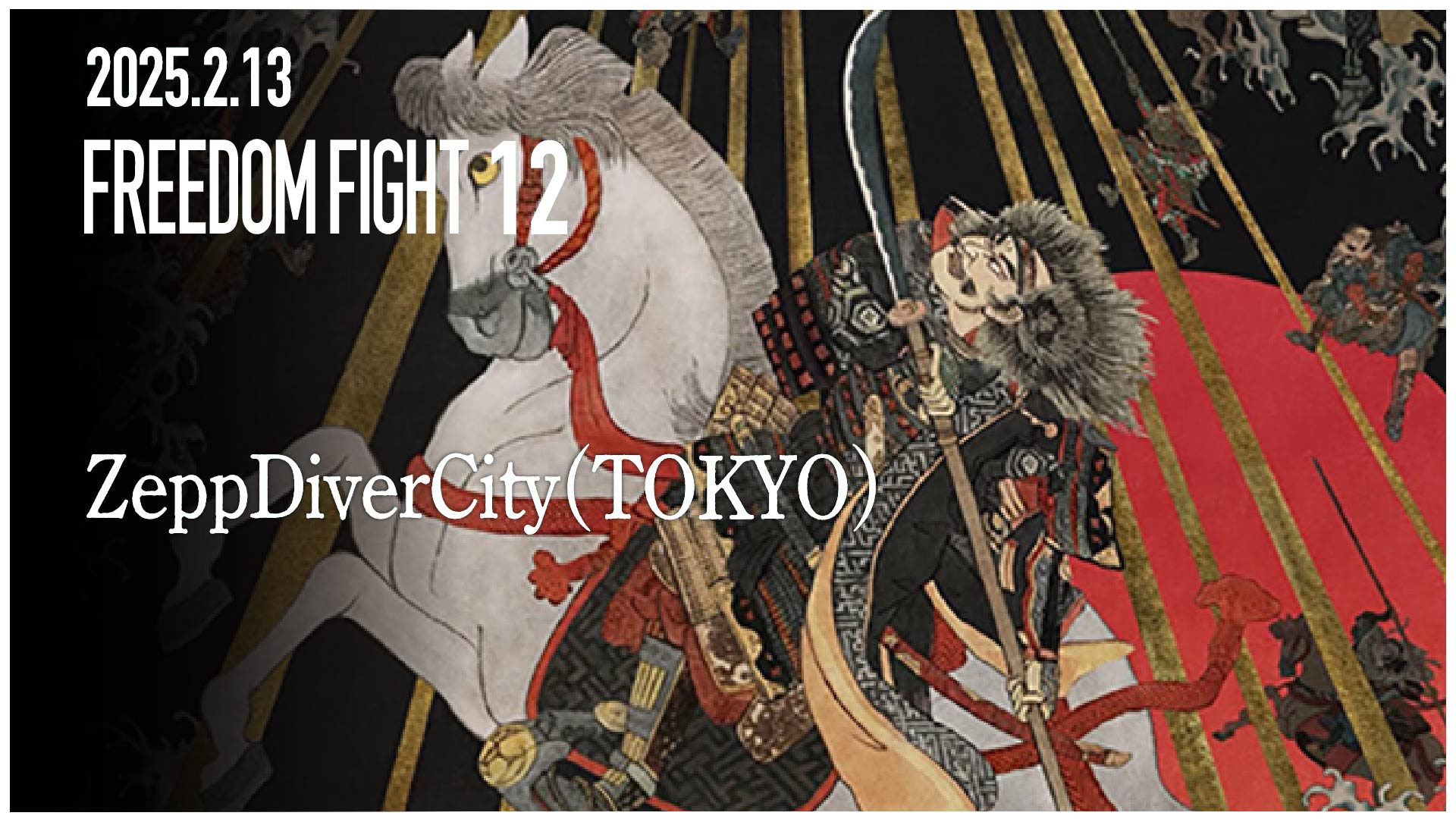@ TOKYO (Zepp DiverCity)/東京
DIGEST MOVIE ▶︎
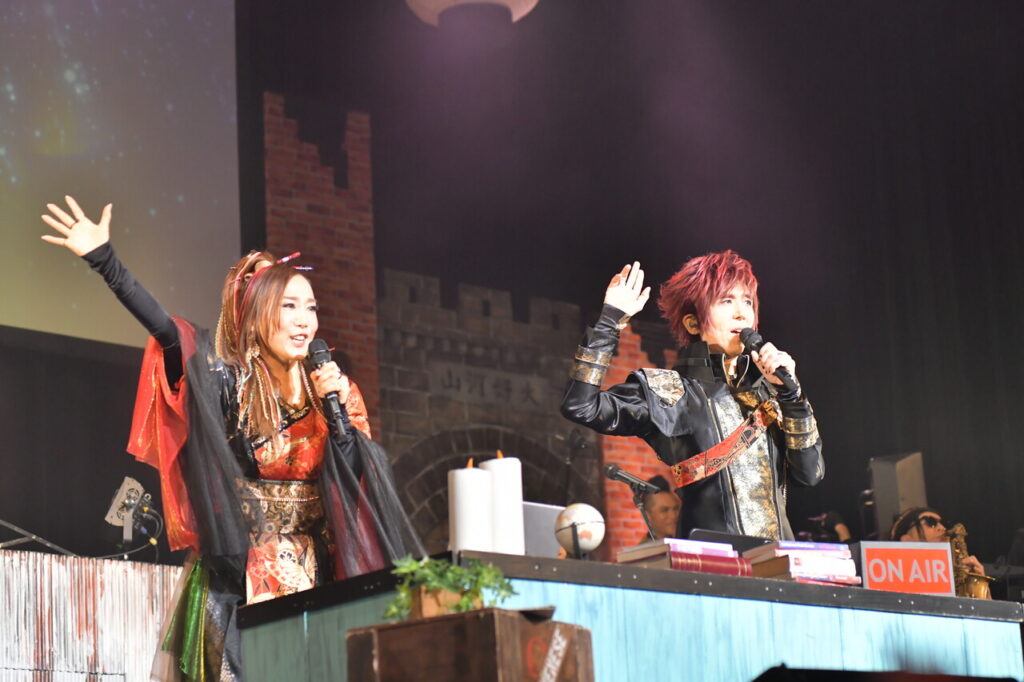
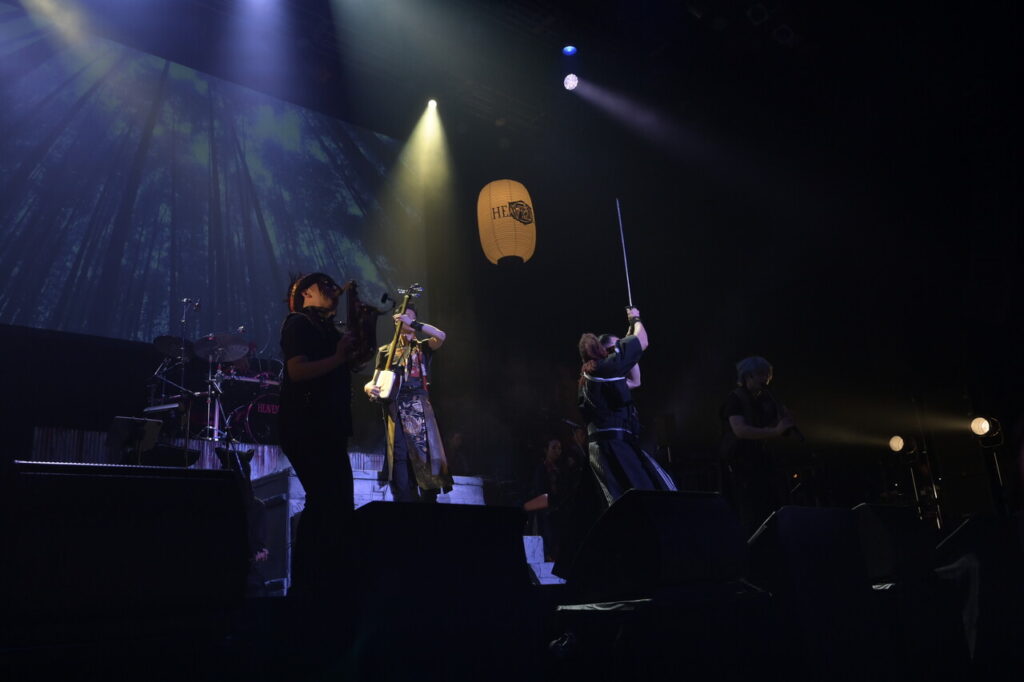
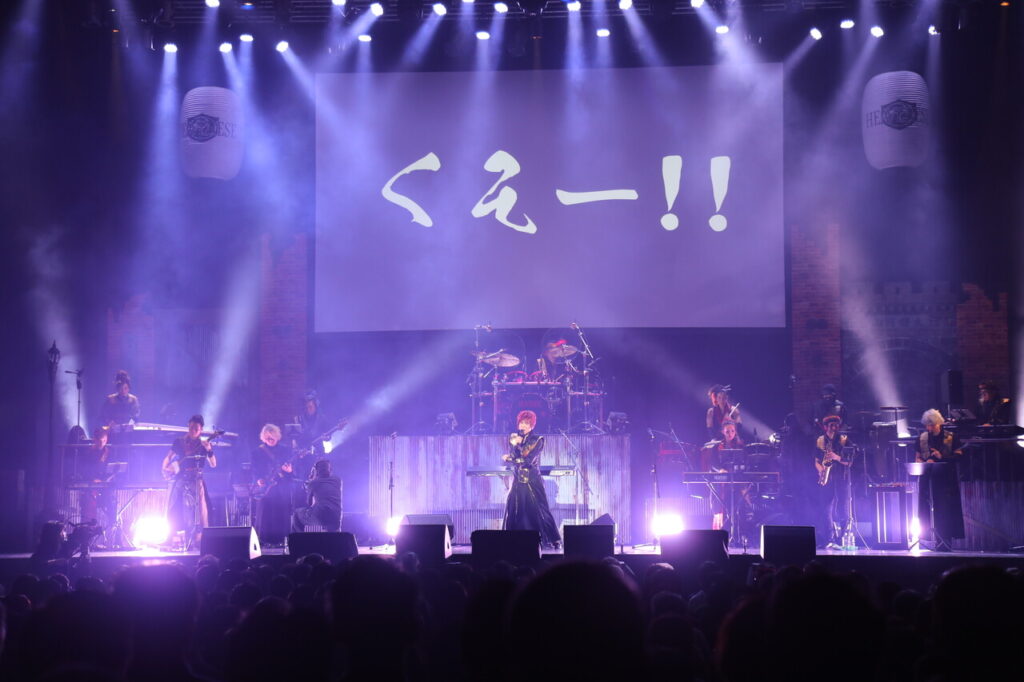
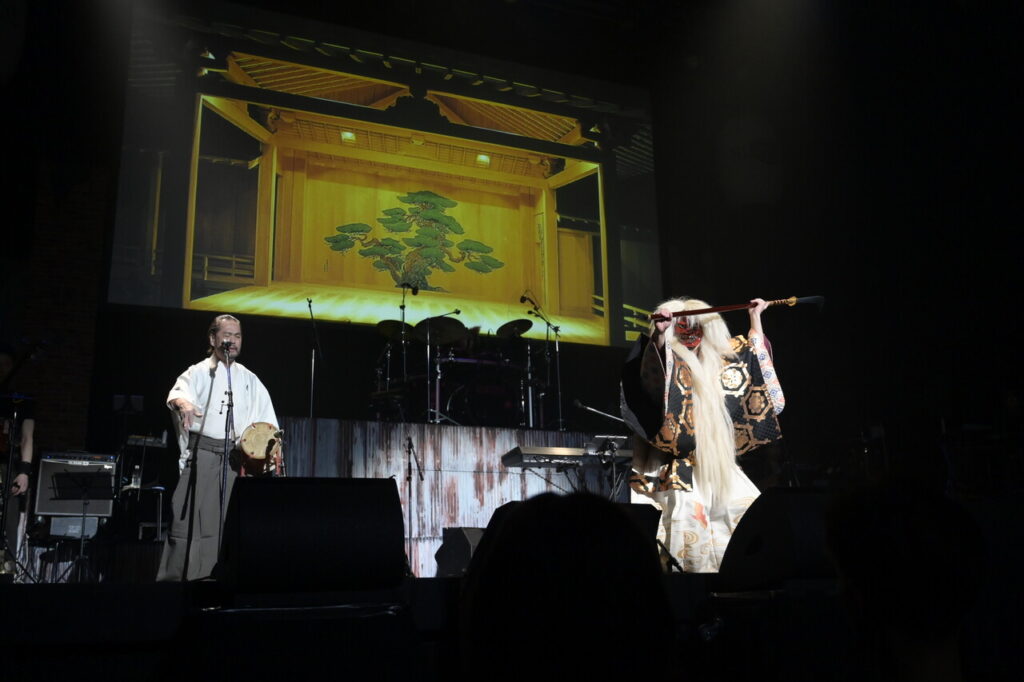

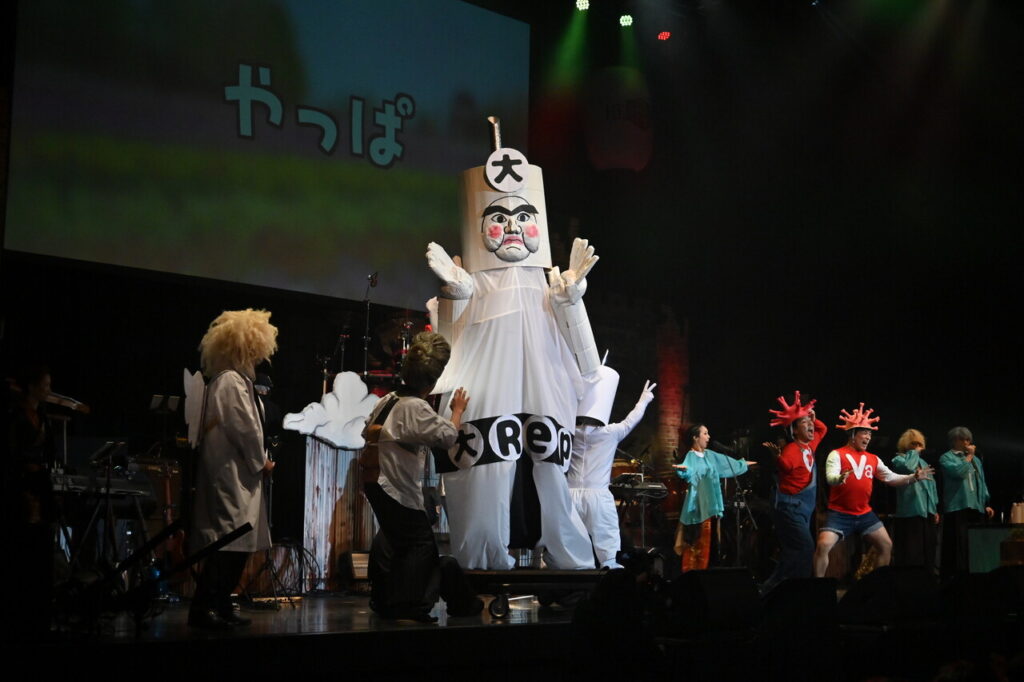
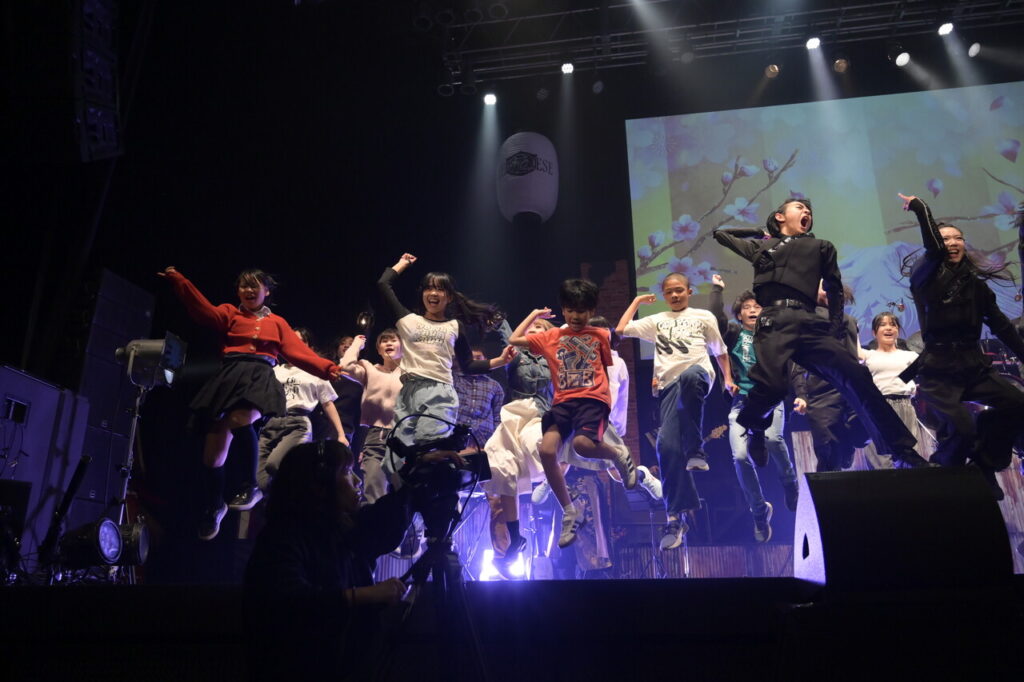
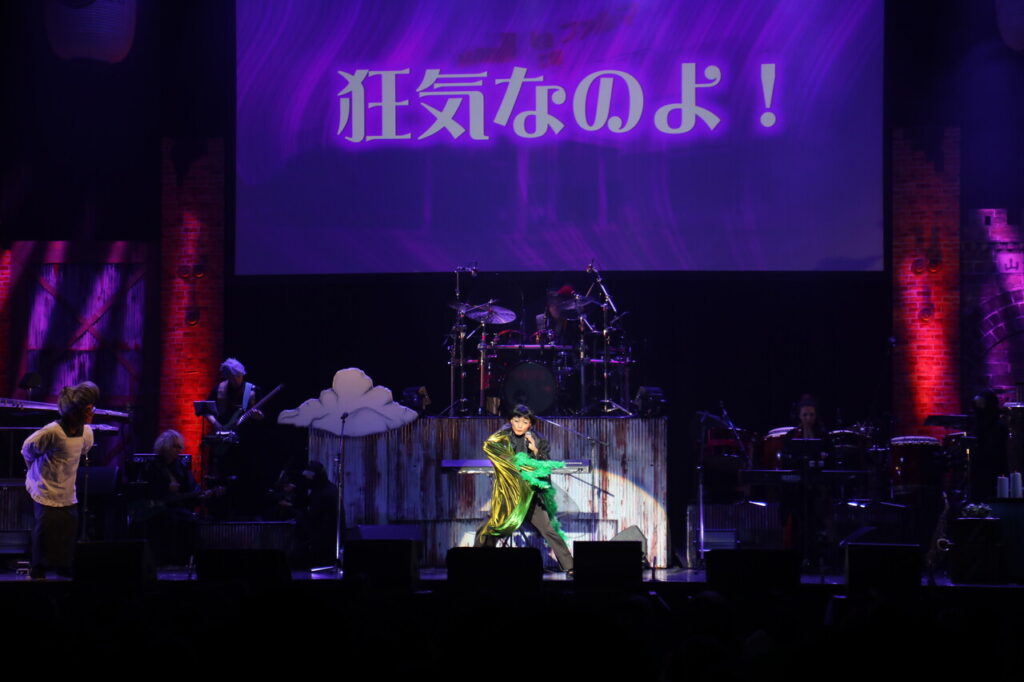

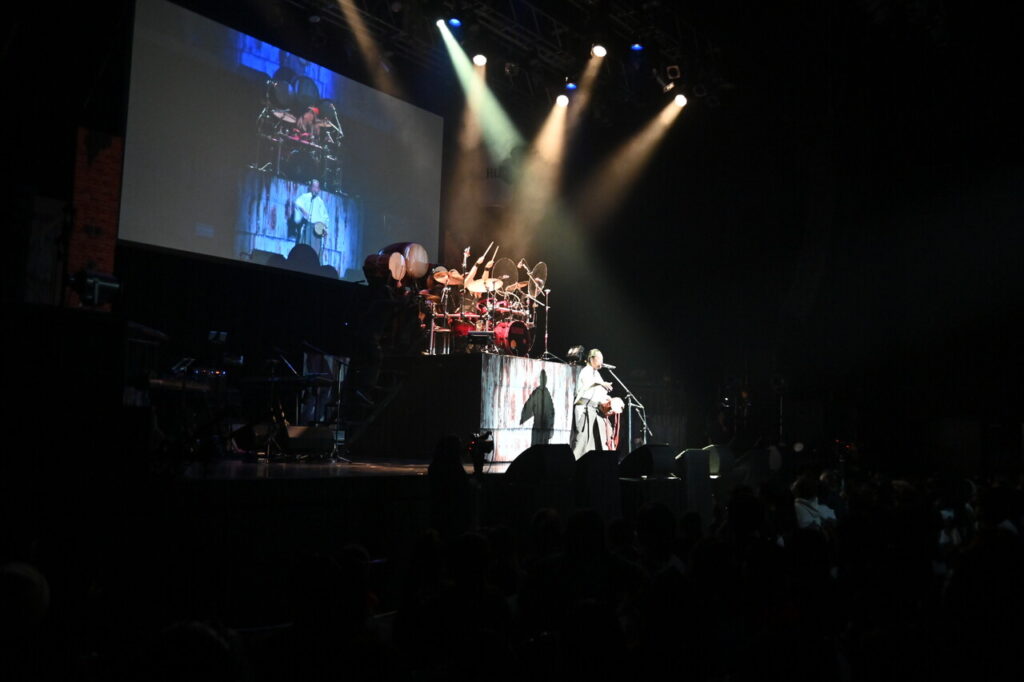
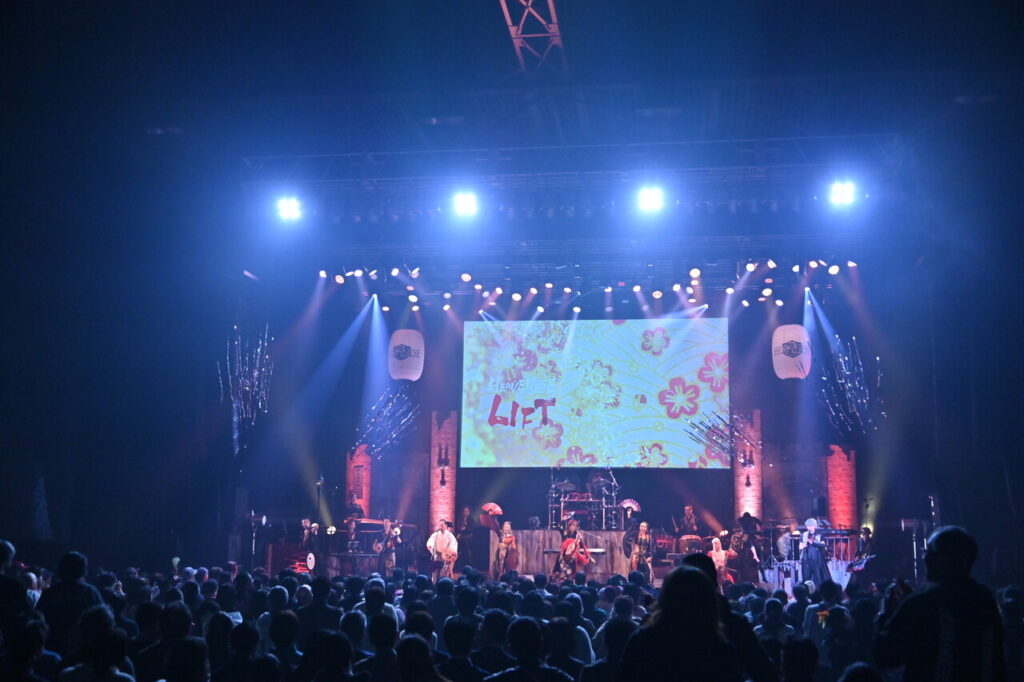

CUSTOMER COMMENTS
50代女性
大事なことを、知らなかったことを、こういうことがあったんだ。と。
すごく胸が締め付けられますね。知らないということはちょっと恐ろしいことだなぁと思って、今日大きな収穫でしたし、感動しました。
あと、舞台での若い子たちが、未来につながっているんだなというのでそれもまた感動でした。呉服屋に勤めていて、同じように日本の文を伝えていこうという気持ちはありますが、精神的なことを今日知り、日本人であって良かったなと思いました。
2回目 8歳女の子
楽しかった!音楽が好き。久美子さんが好き。
40代男性
youtubeを見ていて知りました。長いし、深いし、紹介しづらかったんですけど毎週やっているからと思って娘に見せたら、娘がめちゃめちゃファンになって。y’sBe学園にも行きたいって言ってて。
(母親より「娘は久美子さんはお母さんと同じくらい、世界で2番目(お母さんの次)に好き。こんなに美しくて、歌が上手い人はいないといつも言っています。前に手紙を渡したことがあります。いつか話すことが夢なんですって。)
50代男性2回目
毎週拝見しているんですがやっぱり間近で本物を見ると良いですね。感動しますし、親しみが湧きますし、やっぱりほら、普段聞けない日本の歴史とか教えてくれるし。僕も個人的におじさんが戦死しているんですよ。だから昔の兵隊さんの写真を見ると、おじさんだと思っちゃって。会ったことはないんですけどね。ああいう人たちの気持ちがあるから、今の僕たちがいるんだなと本当に教えられますし、大事にしていかないといけないと思いますよ。
Female in her 50s, first time participant
This is the kind of thing that I didn’t know was important. I was so moved.
It was very heartbreaking. It was a big harvest today, and I was very moved by the fact that not knowing is a little frightening.
I was also moved by the fact that the young people on stage are connected to the future. I work at a kimono shop, and I have the same desire to pass on Japanese culture, but I learned something spiritual today that made me feel glad to be Japanese.
2nd time 8 years old girl
It was fun! I like the music. I like Kumiko.
Male, 40s
I found it through youtube. It’s long and deep, and I didn’t want to introduce it to my daughter, but I showed it to her because it was on every week, and she became a huge fan and wanted to go to y’sBe Academy.
(Her mother said, “My daughter loves Kumiko as much as her mother, second in the world (after her mother). She always says that no one is so beautiful and such a good singer. I have given her a letter before. She says it is her dream to talk to him someday.)
Male in his 50s, 2nd time
I watch the show every week, and it is good to see the real thing up close. I am moved and feel familiar with them, and they teach me things about the history of Japan that I would not normally hear. I personally had an uncle who died in the war. So when I see pictures of soldiers from the past, I think of him as my uncle. I have never met them. I think that we are here today because of the feelings of those people, and I think that we should cherish them.
Translated with DeepL.com (free version)
-高橋清隆の文書館-より
HEAVENESEお台場ライブに1000人、終戦後の旧満州北部の邦人救出劇から同胞愛を喚起
和楽器ソウルバンドHEAVENESE(へヴニーズ)が2月13日、東京都江東区のZepp DiverCity(ゼップ・ダイバー・シティ)で今年初のコンサート“FREEDOM FIGHT(フリーダムファイト)12”を開催した。東京y’s Be学園の生徒たちも関わったこのライブ。少し時間がたってしまったが、3月22日に卒業式を迎えた彼らへの祝福も込めて、振り返ってみたい。
2025(令和7)年は昨年に引き続き東京大空襲から80年、大東亜戦争終結からも80年の節目であることから、帝都防衛および内蒙古に接する旧満州(中国東北部)北部から邦人脱出させるために命を懸けた先人たちの生きざまを紹介しながら、観客約1000人に同胞愛を喚起した。
ゲストに大鼓(おおつづみ)奏者で重要無形文化財総合指定保持者の大倉正之助さんや米国でも活躍した日本語ラッパーのKダブシャインさん、モンゴル楽器の馬頭琴奏者のイラナさん、武士道と伝統芸能の美しさを伝える「武楽座」主宰の源光士郎(みなもと・こうしろう)さんを迎え、ステージはおよそ3時間に及んだ。
演奏したのは全17曲。その他に、Kダブシャインさんのオンステージや、パロディソングを中心にしたHEAVENESEのコントコーナーが設けられた。
ステージは、『Spring』で幕を開けた。毎週日曜夜8時のインターネット番組『HEAVENESE style』でおなじみの曲だ。スクリーンにバンドのメンバーが紹介され、舞台両袖からリーダーでボーカルのマレ(Marre)とクミコ(Kumiko)が現れると、大拍手で迎えられた。「マレと」「クミコと」「そして、みんなです」とオープニングトークを始める。お台場の地名由来を復習した。
いったん幕が引き、消灯。舞台中央の箱が開き始め、メンバーが次々と出て来る。尺八、琴、津軽三味線、太鼓と音が重ねられ、インストロメンタル曲『The Code of the Samurai(武士道)』に合わせ、剣狼による殺陣が披露された。
キーボードの音から、ダンサブルなソウル『All of me』が続く。クミコが「everybody clap your hands, up」と呼び掛け、会場内の気温は一気に上昇。Kダブシャインもラップで登場した。
『イノセントマン』の前に、マレは「世の中が狂っても、理想を諦めてはいけない。全ての人に贈る応援歌」とアナウンス。14人ほどのキッズ忍者の踊りとともに始まった。
〈15歳の時は理想主義者だった 世間知らずだったけど 戸惑いもなかった 世界を変えてやると意気込む心に 理想と現実の区別などなかった〉
〈16のときさ 社会の歪(ひず)みを見せつけられて とことん失望したのは 夢を少しずつ捨てていくことこそ 大人になる ことだと気づき始めたんだ〉
偏差値による序列主義の教育体制に疑問を持ち、高校2年のときに自主退学したマレの本心を吐露した曲だ。その思いは今、東京y’s Be学園の運営に結実している。曲の後半からは、東京y’s Be学園の生徒も加わり、約40人がステージで飛び跳ねた。
曲が終わるとマレは、「我々のホープ、未来があるねえ」と目を細めた。
『Samurai BRIDGE』の後、「どーよ」「いーよ」とステージと客席が声を掛け合う。マレが「戦後80年、一体我々は何を学ぶべきだろうか」と問い掛けた。
「国はうそをつく。メディアも負けている戦争を勝っていると言い、負けた。5年前、人々はつくられたパンデミックにだまされた。99.98%が死なない病気が恐ろしいだろうか? 今、ワクチン被害者が急増し、戦後最大の薬害になってるじゃないか」
サックス担当のナオヤ(Naoya)が登場し、ラップが始まる。
〈上から目線のうそつきたちにだまされ 忘れ まただまされて 今だ まただまされて 茶番で バンで バンで 失われかけてるフリーダム〉
マレが中央に出て、「いつの時代も権威主義・独裁者の到来にしっかりと目を開いていないと、甘い言葉にだまされてしまうから気を付けろ!」と警告し、『ジェラルミン閣下』を演奏した。
大倉正之助・源光士郎の両氏による鼓独奏と演舞があった。マレは「雅楽は世界で最も古い形をそのままとどめている。能は芸事であると同時に忍び、今で言うスパイでもある。その継承者」と紹介。「守るべき日本をご堪能ください」と場を譲る。
「イヨ~オ ホオ~オ トン」
源さんは長髪を振り乱しながら、なぎなたを振るった。
大日本帝国陸軍・駐蒙軍(司令官・根本博陸軍中将)の独立混成第二旅団「響兵団」(参謀・辻田新太郎少佐)の活躍をマレが語った。この日のメイントークだ。
舞台は1945(昭和20)年8月19日、万里の長城の東端に位置し「北京の北門」と呼ばれる旧満州北部の張家口(ちょうかこう)市。すでに日本が降伏しているにもかかわらず、旧ソ連軍は日ソ不可侵条約を破って襲来した。日本人居留民およそ4万人を無事帰還させるため、根本らは奮闘する。とりわけ、最前線の丸一陣地を守った辻田らの「響兵団」は、自ら人間の盾となって肉弾戦に挑んだ。
キーボードのカッサー(Kassa)が不安感とスピード感のあるピアノソロを、5分にわたって奏でる。1970年代のポップ『ジンギスカン』や童謡『ふるさと』のフレーズも織り交ぜられた。
マレ「軍隊のためでもない、天皇陛下のためでもない。ただ同胞を守るための戦いがあったことを、我々は知らなければ」
クミコ「敵の侵入を防ぐための戦いは、お台場で思いを馳せるのに本当、ふさわしい」
ステージ上は一転、明るくなり、『HEAVENESE style』のセットが用意されていた。ナオヤが「ヘブニ・イズ」アナに扮(ふん)する悪ふざけをした後、Kダブシャインのオンステージと、コントコーナーが設けられた。
マレは「能のパロディが狂言。日本は風刺の文化なんだけど、今の日本人は苦手。コロナにしても、国や自分たちがやってることをこっけいな姿にして笑っちゃって、自分の在り方を考えることが大事」と補足した。
Kダブシャインはトランプ米大統領の“MOGA(Make America Great Again)”に倣い、“MOGA (Make Oretachi Great Again)”を提唱。この日は『新しい時代へ』『UNSTOPPABLE(アンストッパブル)』など4曲を披露した。とりわけ、『ソンはしないから聞いときな』は、東京y’s Be学園の生徒たちに向けられているように聞こえた。
〈今子供に責任 全くないのに 一番その君らが危ない 変な大人には気をつけよう で もしも困った様子でも 「車に乗りな」って言ったらね 絶対一人で行っちゃ駄目 とにかく急いで逃げて 家に帰るか「すぐオレに言え」〉
〈何だってやれる 何だってなれる 夢見つけたら頑張ってられる
何だってやれる 何だってなれる 強く信じてれば頑張ってられる〉
歌え終えると、「アメリカの次は俺たちがグレートになる番だぜ。とっくにグレートなんだけど、思い出して。知らないやつらに教えてあげてください」とステージを後にした。
コントコーナーは、ジョンホプキンズ島村博士が天国から降りて来て、マスクばあさんにHEAVENESEのパロディーソングを聞かせて、洗脳を解くという設定。披露されたのは、『ヤツラの邪心』『君にワックは効かない』『レプリカのファル魔』『オオレプリ』『せいじの嘘(うそ)』『MOGA』の6曲。中でも、筆者が初めて耳にして感心したのが、見たわインチキの歌う『レプリカのファル魔』の歌詞だ。
〈いやね、ワクチは レプリカのファル魔 お気のすむまで 射たすがいいわ あなたは得意の稼ぎでも 治験の狭間で死んでいく 重い罪だわ 明治 明治 狂気なのよ!
そしてあいつは 運び屋の男 運んだブツは 危険なブツよ〉
舞台は暗転し、メイントークが続く。たった2500人の響兵団は決死の白兵戦(はくへいせん)を3昼夜繰り広げ、10倍以上の敵を3日間くぎ付けにした。4万人の在留邦人を脱出させてから、極限状態の中、徒歩で250キロ歩き続け北京に逃れた。
『たどり着けるまで』が演奏される。
〈海深く 深く 波にのまれても 荒れ果てた 険しい 大地を這(は)っても 守りたいもののため 散りゆくとも また会おう いつか 靖けき国で 汚れ果てても 決して負けない たどり着けるまで この愛を守るよ〉
東京y’s Be学園の生徒が再び登場し、日の丸の小旗を振った。
続いて披露されたのは、『シルクロード』。HEAVENESEが米国で初めて発表したミニアルバムのタイトル曲である。ゲストのイラナさんによる馬頭琴の音色で始まった。ピアノ、太鼓が続き、切ないバラード調の旋律が会場を包んだ。
駐蒙軍による脱出作戦と同じ時、満州には神州不滅特攻隊が存在したことをマレが紹介した。もはや爆弾も尽きていたが、旧ソ連軍や八路軍(中国共産軍)の襲撃を少しでも遅らせて邦人が逃げる時間を稼ぐため、11人が軍紀を犯して敵の戦車への体当たり攻撃に出たのだ。
この中に、特攻機に乗り込んだ女性がいた。谷藤徹夫の新妻、朝子だった。「生きてソ連軍の辱めを受けるくらいなら、私もあなたと共に行かせてください」と夫の反対をも押し切り、真っ白なワンピース姿で後部座席に身を押し込んだのだ。
「同胞を守るため、自らの命を捧げてくれたこんな尊い人々がいた。彼らの熱い鼓動を今、聞き逃すな」とマレが告げ、ドラム、太鼓など4つの打楽器によるパフォーマンス「四人羽織」が演じられた。途中から、大倉正之助さんも加わる。
演奏が終わり静寂が戻ると、先ほどの心中特攻の余韻だろう。あちこちから、すすり泣く声が聞こえた。マレは「日本の降伏後、戦わなくていいはずの人々が命を捧げて戦ったのは、ひとえに同胞愛からだった」と評じ、『生まれる前にいた場所へ』が演奏された。
ステージ中央のスクリーンに、日本の美しい生活の営みや風景が映し出される。
〈あなたに帰ろう 今とりもどそう 変わらない心の故郷へ〉
今回、他の楽曲を含めほとんどのイメージ映像が更新されていた。
メイントークはクライマックスへ。張家口の邦人脱出作戦を指揮した辻田参謀は、自軍に撤退命令を出した後、自決を試みた。彼の祖先に、三河武士の鳥居強右衛門(とりい・すねえもん)がいた。長篠城が武田軍に包囲され、食糧庫も焼失して絶体絶命となる。城兵500人に対し、武田軍は1万5000人。君主の奥平貞昌(おくだいら・さだまさ)は、家康のいる岡崎城へ援軍を要請することを決断。強右衛門が使者として手を挙げる。
足軽の強右衛門は武田軍の警戒の目をくらまし、決死の覚悟で岡崎城にたどり着き、援軍を要請。到着していた織田信長の援軍3万と合わせ、織田・徳川の連合軍3万8000人が長篠へ向かう手はずがつく。しかし、この朗報を一刻も早く味方に伝えようと城に戻る途中、武田軍に捕らえられる。武田勝頼は、強右衛門に取り引きを迫った。城の前で「援軍など来ないから諦めて城を明け渡せ」と言えば、武田家の家臣として厚遇することを約す。しかし、城前に出された強右衛門は、「援軍がやって来る。諦めずにしばらく持ちこたえよ」と叫んだ。
強右衛門はその場でキリストと同じようにはりつけにされ、殺された。しかし、これにより大いに士気が上がり武田軍の攻撃から城を守り続けることができた。2日後、武田軍は到着した信長軍にせん滅させられた。
マレはこの史実を紹介した後、「我々は彼らに恥じない生き方をしているんだろうか。今、思い出そう、同胞愛を」と呼び掛けた。この言葉に、筆者は胸を打たれた。同時に、勇敢な祖先たちに合わせる顔がないことに気付き、恐れ入るばかりだった。
『Together(トゥゲザー)』に続き、最後はアーティスト全員で『Lift(リフト)』を披露。2階席まで観客が立ち始め、扇子などを手に体を揺らした。
アンコール曲は『大切なひとよ』。先の戦争で帝都防衛最後の砦(とりで)となった飛行第244戦隊を題材に、現代の若者たちへの応援歌になっている。
マレは、「国の形や国境の在り方が変わっていくかもしれないが、この同胞愛があれば、日本は滅びないから。そんな思いをまず、身近な人に示していけたなら」と述懐した。
2番からは、東京y’s Be学園の生徒も登場。
〈手を取り合って上を見上げ この道を歩き続けよう
信じる心ある限り 同じ明日を見続けよう〉
生徒たちは手を取り合って、上を指差した。
東京都世田谷区に住む70代の女性は、毎週『HEAVENESE style』は見ているが、ライブに足を運んだのは初めてだという。「きょうはどうにか都合がつきました。HEAVENESEの魅力は、政治のことでも、マスコミが取り上げないことをはっきり言ってくれるところ。内容が濃い。毎回、日本人の心を取り戻せみたいなことをさりげなく言う。それがいい」と余韻に浸っていた。
一緒に来ていた川崎市内の70代女性は、どんなアーティストか告げられずに誘われたという。「良かった。歌もそうだし、歴史の勉強になった。和楽器は聴きたいと思っていた。こういう機会は初めてで、うれしかった」と満足そうだった。愛国心については、「そういう気持ちは大事。戦争は絶対駄目だけど」。ワクチンについては「初めはコロナが怖かったから、何回か打った。でも、この友達の影響でやめた」と話していた。
HEAVENESE
On February 13, the Japanese instrumental soul band Heavenese held their first concert of the year, “FREEDOM FIGHT 12,” at Zepp DiverCity in Koto-ku, Tokyo. The event took place at Zepp DiverCity, Tokyo. Students from Tokyo Y’s Be Academy were also involved in this concert. Some time has passed, but we would like to take a look back at the concert to congratulate the students who celebrated their graduation on March 22nd.
As the year 2025 marks the 80th anniversary of the Great Tokyo Air Raid and the 80th anniversary of the end of the Greater East Asia War, the event reminded the approximately 1,000 audience members of their love for their fellow countrymen by introducing the lives of those who risked their lives to defend the imperial capital and help Japanese people escape from former Manchuria (northeastern China), which borders Inner Mongolia in the northern part of the country. Among the guests were the Otsuzumi Drummers, who played the traditional Japanese drum.
The guests included Okura Shonosuke, an otsuzumi (large drum) player and holder of the general designation of Important Intangible Cultural Property, K Dubshine, a Japanese-language rapper who has performed in the United States, Ilana, a Mongolian matouqin player, and Minamoto Koshiro, the leader of Bugakuza, which promotes the beauty of bushido and traditional performing arts, The performance lasted about three hours.
They performed 17 songs in total. There was also an on-stage performance by K Dubshine and a HEAVENESE comedy corner with parody songs.
The stage was opened with “Spring”. The song is a familiar one from the Internet program “Heavenese style” that is broadcast every Sunday night at 8:00 pm. The band members were introduced on the screen, and when Marre and Kumiko, the leader and vocalist of the band, appeared from both sides of the stage, they were greeted with loud applause. They began their opening speech with “Marre,” “Kumiko,” and “And that’s everyone. They reviewed the origin of Odaiba’s place names.
As the curtain falls, the lights go out. A box in the center of the stage begins to open, and the members emerge one by one. Shakuhachi, koto, tsugaru shamisen, and taiko drums were piled on top of each other, and a sword and wolf sword fight was performed to the instrumental piece “The Code of the Samurai.
The keyboard sounds were followed by the danceable soul of “All of me”. Kumiko called out, “Everybody clap your hands, up,” and the temperature in the room soared, with K Dubshine also making an appearance to rap.
Before “Innocent Man”, Marre said, “Don’t give up your ideals, even if the world goes crazy. A cheering song for everyone,” he announced, and the song began with about 14 kid ninjas dancing.
When I was 15, I was an idealist, naive but not confused, determined to change the world, with no distinction between ideal and reality.
When I was 16, I was so disappointed by the distortions of society that I began to realize that the only way to grow up is to slowly give up your dreams.
This song expresses the true feelings of Marre, who voluntarily dropped out of high school in his sophomore year because he had doubts about the education system based on deviation scores. These feelings have now borne fruit in the management of Tokyo Y’s Be Gakuen. In the second half of the song, about 40 students from Tokyo Y’s Be Gakuen joined the group and jumped on stage.
After the song Marre narrowed his eyes and said: “Our Hope, you have a future, man.
After “Samurai Bridge” the stage and the audience exchanged “Do yo” and “Yayo”. Marre asked: “Eighty years after the war, what should we learn?
The country lies. Five years ago, people were deceived by a manufactured pandemic. Now the number of vaccine victims is skyrocketing, making this the biggest drug epidemic of the postwar era.
Naoya, the saxophonist, appears on stage and begins to rap.
[I’ve been betrayed, forgotten, betrayed again, betrayed now, betrayed again, farce, bang, bang, almost lost freedom…].
Marre takes center stage: “Beware of being deceived by sweet words if you don’t keep your eyes firmly open to the coming of authoritarianism and dictatorship in every age!” He warned, playing “His Excellency Geraldine.
There was a drum solo and performance by Shonosuke Okura and Koshiro Minamoto. Marre said, “Gagaku has preserved the world’s oldest form intact. Noh is not only an art form, but also a form of ninjutsu, or what we now call espionage. Noh is both an art form and a form of espionage. He left the place to the audience and said, “Please enjoy Japan, which should be protected.
Iyo~o ho~o ton.”
Minamoto-san shook his long hair and waved his naginata.
Marre spoke about the activities of the 2nd Independent Mixed Brigade “Hibiki Hyoban” (Chief of Staff: Major Shintaro Tsujita) of the Imperial Japanese Army stationed in Mongolia (Commander: Lieutenant General Hiroshi Nemoto, Army). This was the main lecture of the day.
The scene is the city of Zhangjiakou in northern Manchuria, known as the “North Gate of Peking” at the eastern end of the Great Wall of China, on August 19, 1945. Despite the fact that Japan had already surrendered, Soviet troops attacked the city in violation of the Soviet-Japanese Nonaggression Pact. Nemoto and his men struggle to bring the 40,000 Japanese residents to safety. In particular, Tsujita and his “Hibiki Hyoudan,” defending Maruichi’s frontline position, challenged the Soviets by becoming human shields and fighting with bullets.
Keyboardist Kassa (Kassa) played an anxious and rapid piano solo for five minutes, interspersing phrases from the 1970s pop song “Genghis Khan” and the children’s song “Furusato.
Marre: “It’s not for the army, it’s not for the emperor. We have to know that there was a battle just to protect our people”.
KUMIKO: “The battle to prevent the enemy’s invasion is truly worth remembering in Odaiba.”
The stage was lit up and a set of “Hevenese Style” was prepared. After Naoya’s prank of dressing up as “Hebni Is” Anna, K Dubshine was on stage and a comedy corner was set up.
Marre said, “Kyogen is a parody of Noh. Japan is a culture of satire, but Japanese people today are not good at it. Even in Corona, it is important to laugh at the country and what we do as a comic figure and think about how we should be,” he added.
K Dubshine followed U.S. President Trump’s “Make America Great Again (MAGA). MOGA (Make Oretachi Great Again). On this day, they performed four songs, including “Toward a New Era” and “UNSTOPPABLE. The song “Son wa shinaikara kiitokina” sounded like it was addressed to the students of Tokyo.
Kids are not responsible at all, but you’re the most dangerous of all, so watch out for strange adults, and if they look like they’re in trouble and I say, “Get in the car,” don’t go alone, just run away and go home or tell me right away.
You can do anything, be anything you want.
Anything is possible, anything is possible, if you believe hard enough, you can do it.
When he finished singing, he said, “After America, it’s our turn to be great. We’ve been great for a long time, but remember. Tell those who don’t know,” he said as he left the stage.
In the comedy corner, Dr. John Hopkins Shimamura comes down from heaven and plays a parody song of HEAVENESE for Grandma Mask to unbrainwash her. The six songs performed were “Yatsura no Yakushin”, “Kimi ni Wak ga Nai”, “Replica no Faluma”, “Oorepuri”, “Seiji no Uso (Lie)”, and “MOGA”. Among them, I was impressed by the lyrics of “Replicated Faluma,” which I first heard sung by Miwa Inchiki.
“No, vaccum, replica pharma, shoot to your heart’s content, you’ve earned your keep, but you’re dying between trials, and that’s a serious crime!
And that’s the guy who’s transporting the dangerous stuff.”
The stage went dark and the main talk continued. The 2,500-strong Hibikibyou (the Japanese Resident Japanese Army) fought a desperate battle for three days and nights, pinning down an enemy 10 times their number for three days; after escaping 40,000 Japanese residents, they walked 250 kilometers on foot in extreme conditions before escaping to Beijing.
The song “Till We Reach There” will be performed.
Deep in the sea, deep in the waves, crawling on the rugged earth, for the sake of what I want to protect, even though I am scattered, we will meet again… Someday, in the land of peace, even if it is polluted, I will never be defeated, I will protect this love until I get there.
Students from Tokyo Y’s Be Gakuen appeared on stage again, waving a small flag of the Japanese flag.
Next was “Silk Road,” the title track from Heavenese’s first mini-album released in the United States. The song began with the sound of the Matouqin played by guest Ilana. Piano and drums followed, and a sad ballad-like melody enveloped the audience.
At the same time as the escape operation by the Gumong Army, Marre introduced the existence of the Shinshu Immortal Suicide Attack Force in Manchuria. They had already run out of bombs, but in order to delay the attack by the former Soviet Army and the Eight Roads Army (Chinese Communist Army) as much as possible and buy time for the Japanese to escape, 11 of them violated military discipline and went on a physical attack on enemy tanks.
Among them was a woman who boarded a suicide plane. She was Asako, the new wife of Tetsuo Tanifuji. Asako, wearing a white one-piece dress, pushed herself into the back seat of the plane, overcoming her husband’s objections, saying, “If I would rather suffer the humiliation of the Soviet army alive, please let me go with you.
There were such noble people who gave their lives to protect their fellow countrymen. Don’t miss their passionate heartbeats now,” Marre announced, and a performance called ‘Yonin Haori’ was performed with four percussion instruments, including drums and drums. Shonosuke Okura joined in the middle of the performance.
When the performance ended and silence returned, there was a sobbing sound, probably the aftermath of the heart-to-heart suicide attack earlier. Sobbing could be heard from all around. Marre commented, “After Japan’s surrender, people who should not have had to fight gave their lives to fight, but they did so out of love for their fellow countrymen,” and “To the Place I Was Before I Was Born” was played.
On the screen in the center of the stage, beautiful scenes and activities of Japanese life were projected.
Let’s go back to you, let’s go back now, to the unchanging home of our hearts.
This time, most of the images, including those of the other songs, were updated.
The main talk reached its climax. General Tsujita, who led the Japanese exfiltration operation in Zhangjiakou, ordered his troops to retreat and then attempted to commit suicide. His ancestor was Torii Suneemon, a Mikawa samurai. Nagashino Castle was besieged by the Takeda forces, and the food stores were burned to the ground, leaving the castle in a desperate situation. The Takeda forces numbered 15,000 against the castle’s 500 soldiers. The sovereign, Okudaira Sadamasa, decided to request reinforcements from Ieyasu at Okazaki Castle. Kyoemon raised his hand as a messenger.
The footman Koemon dazzles the wary eyes of the Takeda forces, and with a desperate resolve, arrives at Okazaki Castle to request reinforcements. Together with Oda Nobunaga’s 30,000 reinforcements that had already arrived, a combined force of 38,000 men from the Oda-Tokugawa alliance was arranged to head for Nagashino. However, on his way back to the castle to deliver this good news to his allies as soon as possible, he was captured by Takeda’s forces. Takeda Katsuyori pressed Gyoemon to make a deal. He promised to treat him well as a vassal of the Takeda family if he told him in front of the castle to give up and vacate the castle because no reinforcements would come. However, when he was sent to the castle, Gyoemon said, “Reinforcements will come. Do not give up, but hold on for a while,” he shouted.
Kotoemon was crucified and killed on the spot, just as Christ was. Two days later, Takeda’s army was destroyed by Nobunaga’s forces.
After introducing this historical fact, Marre asked, “Are we living up to them? Now, let us remember our love for our fellow countrymen. These words struck a chord with the author. At the same time, I realized that I had no face to match that of my brave ancestors, and I was afraid.
Following “Together,” all the artists performed “Lift,” and the audience, even on the second floor, began to stand and sway with fans and other objects in their hands.
The encore song was “Daijika Hito yo” (“My precious one”). Based on the theme of the 244th squadron, which was the last fortress to defend the Imperial capital in the last war, the song is a cheer for the youth of today.
Marre says, “The shape of the country and its borders may change, but if we have this love for our fellow countrymen, Japan will not be destroyed. I wish I could show such a feeling to those close to me first,” she reminisced.
From the second number, students from Tokyo Y’s Be Academy also appeared on stage.
Hand in hand, looking up, let’s keep walking on this road
As long as we have faith, we will keep looking at the same tomorrow.
The students took each other’s hands and pointed upward.
A woman in her 70s who lives in Setagaya Ward, Tokyo, said she watches “Heavenese style” every week, but this was the first time she had been to a live performance. She said, “I was able to make it today, and the appeal of Heavenese is that they clearly say things about politics that are not covered by the media. The content is rich. Every time, he casually says something like, ‘Bring back the heart of the Japanese people. That’s what I like about it.
A woman in her 70s from Kawasaki City, who was with the group, said she was invited to the concert without being told what kind of artist it was. She said, “It was good. The songs were good, and I learned a lot about history. I had always wanted to listen to Japanese instruments. It was my first time to have such an opportunity, so I was very happy. As for his patriotism, he said, “Such feelings are important. War is definitely not good. Regarding vaccines, he said, “At first, I was afraid of coronas, so I had several shots. But I stopped because of my friend’s influence.
